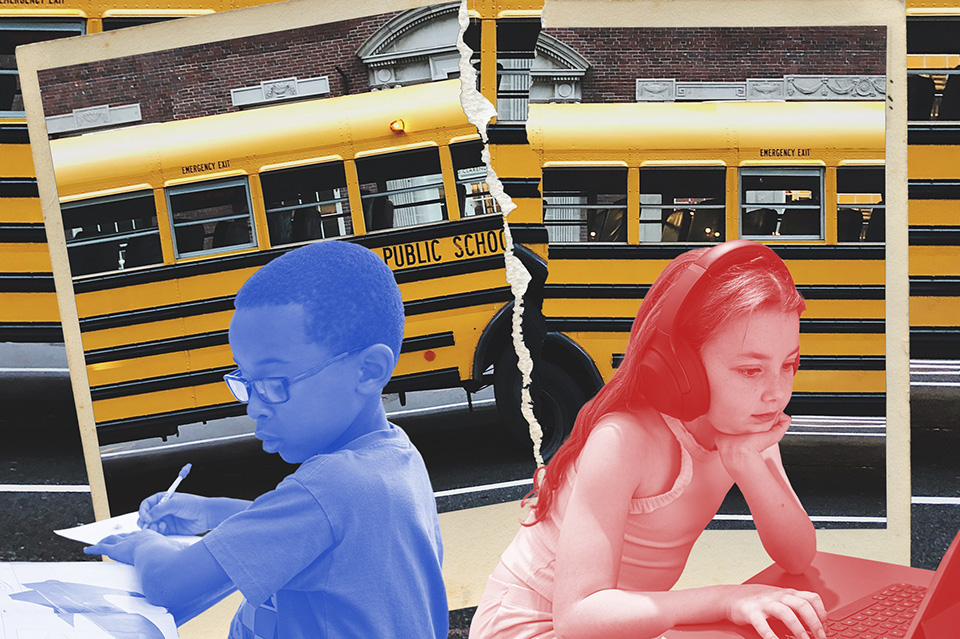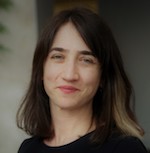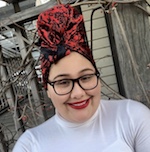Examining racial inequality in public schools during a pandemic
 Illustration/Jessica Tanny
Illustration/Jessica TannyWhen assistant professor of sociology and education Derron Wallace learned about a survey taken by families and students in Boston Public Schools on remote learning and school reopening plans during the COVID-19 pandemic, he saw an opportunity to use his expertise to make a difference.

Derron Wallace
Wallace has previously conducted studies surrounding race and inequality in London and New York City public school districts, but those were either in-depth ethnographic studies or small-scale quantitative studies. To analyze the written survey responses from more than 17,000 families with children attending Boston Public Schools, he would need some help.
"This is not work that one individual could do effectively alone, but there was clear potential if a team pursued this," Wallace said.
The team he assembled included undergraduate students Denezia Fahie ’22, Catherine Romero’ 22, Arlett Marquez ’21, Daryl Cabrol ‘22 and Maria Aranibar ‘22, Charlotte Powley, PhD’20, graduate student Zora Haque and Jennifer LaFleur, a student in Brandeis’ joint doctoral program in the Heller School and sociology department, who has experience with policy analysis.

Jennifer LaFleur
They went through every written response to the survey to identify common trends, and presented the core findings in a policy report submitted to Boston Public Schools earlier this fall.
Their key finding: Families of white students reported less concern about schools reopening than Black and brown families. White families were also overrepresented in the survey responses.
"That, we suspect, is tied to the nature of the resources white families may have access to in the city of Boston," Wallace said. "It's certainly spotlighting racial inequality as it's playing out in the COVID context."

Denezia Fahie
Black and Latinx families, who were underrepresented among the survey respondents as compared to the BPS population overall, were more likely than white parents to report they would need support getting the technology like laptops and high-speed internet for participation in remote learning.
"The responses showed how stark the needs were amongst certain parents. There were students doing school work through smartphones because it was their only access to the internet," said LaFleur. "The struggles with racial equity are clear."
The study also found in-person school experiences were viewed as particularly valuable for the families of children who are multilingual learners.

Catherine Romero
"The support multilingual families need is often rooted in high-level relational engagement in schools," Wallace said. "It's not only about what they learn in the classroom. It's about students being able to play. It's about them being able to interact with others in the cafeteria, in the hallways and on the playground."
For the undergraduate students involved in the project, it was both an opportunity to learn and a chance to give back. Denezia Fahie is an education and African and African American studies major and Wallace is her adviser.
"It felt like I was taking what I learned in the classroom and putting it into practice,” she said. “To be able to take what I have learned about urban schools abstractly and do something practical has been an amazing opportunity. It was exciting to think the work I was doing could result in real change.”
The undergraduates working on the project collaborated with Brandeis librarian Margarita Corral to learn more about data analysis software tools to code hundreds of survey responses each day with Wallace and LaFleur’s guidance. It was the first time sociology major Catherine Romero had worked on a research project of this kind.
“Professor Wallace and the graduate students valued all our voices and made us feel we were all bringing something important to the project, that we were all capable and extremely knowledgeable and up for the task,” Romero said.
The policy report provided detailed recommendations to mitigate inequities through increased communication, expanded outreach to parents and increased co-curricular and cross-institutional support. But Wallace isn’t finished with the research. He plans to do a deeper dive to understand differences not only in race but also in geography across Boston. The research will continue to focus on opportunity gaps and will help public schools in Boston be fairer, more just, and more equitable when they fully return to in-person education, Wallace said.
"As enrollment in Massachusetts public schools decreases during the pandemic, and middle class and elite families turn to private schools or specialized remote learning, the public good of public education remains for our most marginalized, our most vulnerable,” Wallace said. “Looking ahead, how do we protect that public good?"
Categories: Research, Student Life





